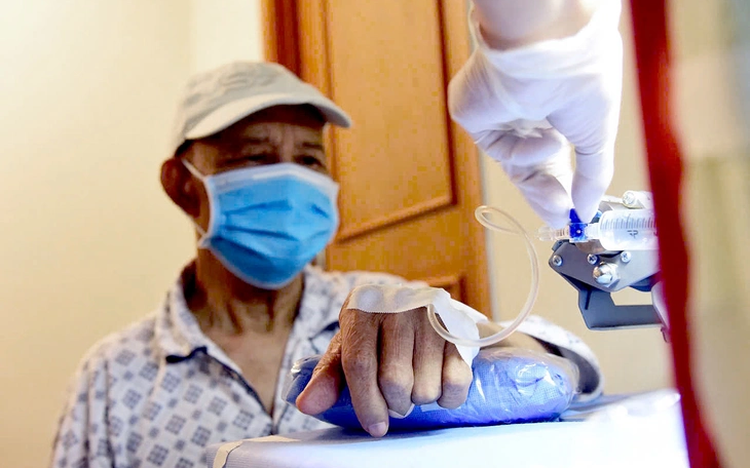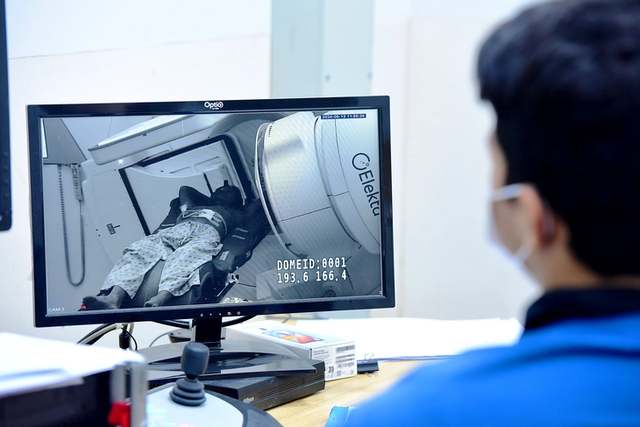
A man is prepared to undergo medical tests in Ho Chi Minh City, Vietnam. Photo: Duyen Phan / Tuoi Tre
The medical test overuse is driven by various factors: insufficient clinical skills among some doctors, patient demands, and profit motives tied to the use of medical equipment.
However, only doctors truly know whether a test is necessary.
Patients often follow their doctors’ instructions without knowing which tests are essential and which are useless.
One tragic example is T.T.K.C., 43, from Ho Chi Minh City, who died after being anesthetized in preparation for a laparoscopic thyroid lobectomy.
She had two young children. C. was diagnosed with a thyroid nodule during a routine health check-up, which included a thyroid ultrasound—despite having no symptoms. A biopsy later revealed papillary thyroid cancer, with a 4x4mm nodule.
She sought treatment at a hospital, where doctors confirmed the diagnosis and scheduled a surgery.
However, as soon as anesthesia was administered, C. suffered cardiac and respiratory arrest.
Despite emergency resuscitation, she did not survive. The cause of death was determined to be an allergic reaction to the anesthesia.
Dr. Dang Huy Quoc Thinh, former deputy director of Ho Chi Minh City Oncology Hospital, noted that surgery in her case might not have been necessary.
According to the American Thyroid Association, thyroid nodules shorter than one centimeter discovered incidentally via ultrasound typically should not be biopsied and should only be monitored.
Ultrasounds should only be performed on patients with symptoms suggestive of thyroid disease, not as part of general health screenings.
C., who had no symptoms, should not have undergone a thyroid ultrasound, let alone surgery.
In another case, D.T.P., 44, from Ho Chi Minh City, underwent a full-body CT scan, brain MRI, and thyroid ultrasound at a private clinic after seeing advertisements promoting early disease detection.
Dr. Thinh emphasized that brain MRI scans are unnecessary in routine health check-ups. Full-body CT scans may be used in specific cases where symptoms are vague and not explained by other tests.
However, no reputable medical guideline recommends full-body CT scanning as part of routine health screenings.
A joint specialist noted that test overuse is common. Advanced techniques like CT and MRI tests are helpful when appropriately used but problematic when overused.
Doctors often face pressure from hospital investors to increase test volumes to recoup the cost of expensive equipment, which can conflict with appropriate medical judgment.
The joint specialist recalled that he once treated an 80-year-old woman previously advised to undergo a joint replacement after being subjected to two high-resolution MRI examinations, without basic diagnostic X-rays.
Upon reassessment, the specialist found surgery unnecessary. Over a year later, the patient remains mobile without surgery.

A medical worker performs a PET/CT scan for a patient. Photo: Duyen Phan / Tuoi Tre
A doctor with years of experience in private hospitals explained that many institutions offer bonuses based on the number of patients, tests ordered, and follow-up visits.
This incentive system can drive doctors to overprescribe tests.
Some patients demand specific tests, and doctors often comply without fully explaining the risks or necessity.
In orthopedics, for instance, many patients ask for MRI scans after sports or household injuries, even when doctors say they are not necessary.
If turned down, some patients will even go to other clinics to get the scans anyway.
Overuse of genetic testing in cancer screening
Dr. Thinh also pointed out the growing misuse of cancer-related tests.
Blood marker tests such as CEA, CA 15-3, and CA 19-9 are often ordered for healthy individuals in Vietnam, even though they are not useful for diagnosing most cancers.
These markers are primarily helpful in monitoring known cancer cases. Slight elevations can be caused by benign conditions, leading to unnecessary anxiety and expenses.
Moreover, some health check-up packages marketed to young people include inappropriate tests, like bone density scans for those under 30—meant only for the elderly or people with specific health issues.
Young women are also being subject to mammography, despite ultrasound being more appropriate for those with dense breast tissue under age 40.
A new trend involves blood-based genetic testing for early cancer detection.
Dr. Thinh warned that while some clinics advertise this as a reliable screening tool, major health organizations, including the World Health Organization, have not endorsed such tests for general cancer screening.
Genetic testing is useful primarily for evaluating hereditary cancer risks and informing patient and family monitoring plans—not for widespread early detection.
Previously, Vietnam's Ministry of Health encouraged hospitals to recognize prior test results to reduce repeated testing.
However, in reality, patients often have to repeat CT or MRI scans at new facilities, even if they have already been done elsewhere.
This could be due to doubts about previous tests' quality or simply a lack of trust between hospitals.
To prevent waste and protect patients, clear guidelines are needed on when re-testing is appropriate, especially for imaging.


Max: 1500 characters
There are no comments yet. Be the first to comment.